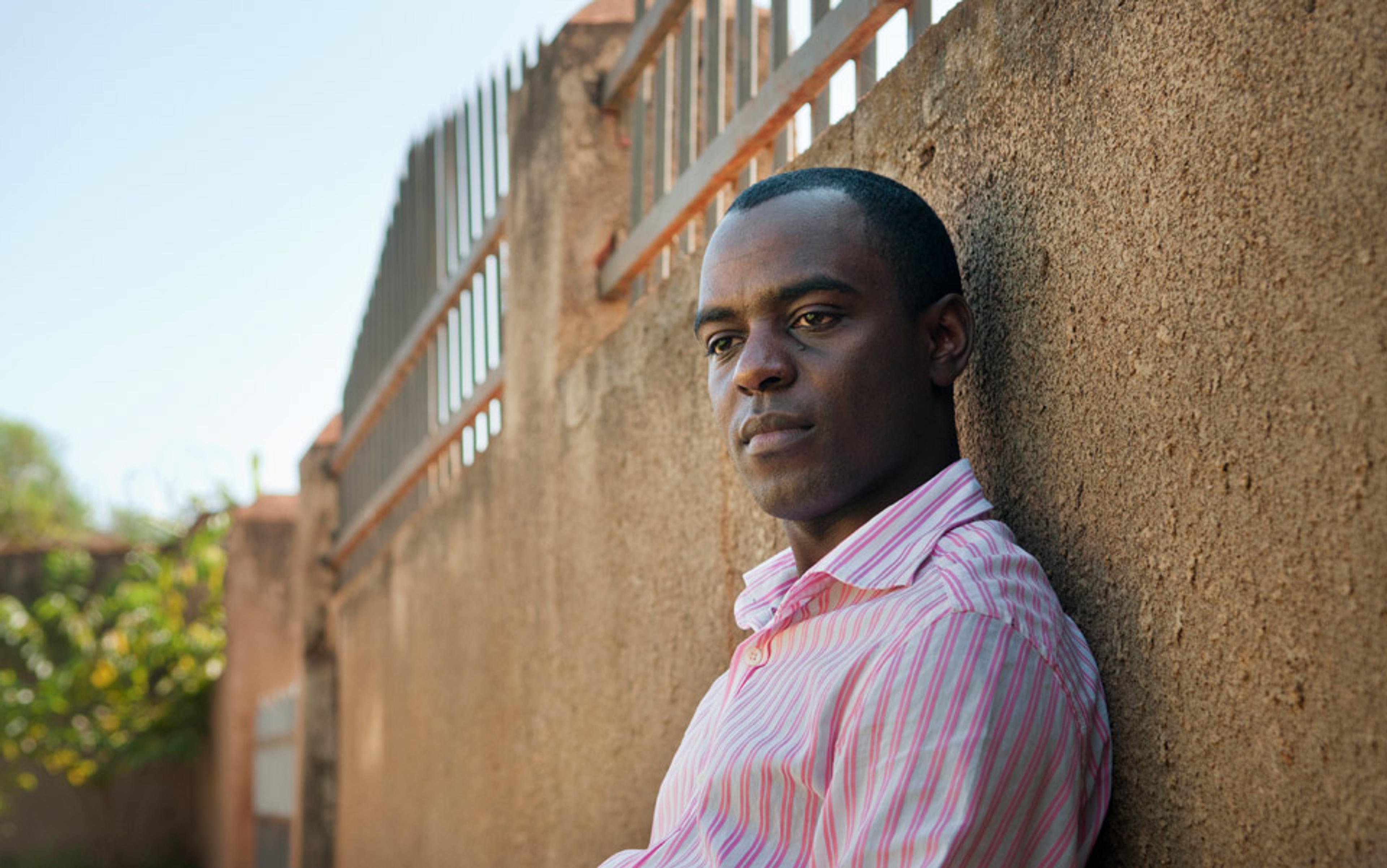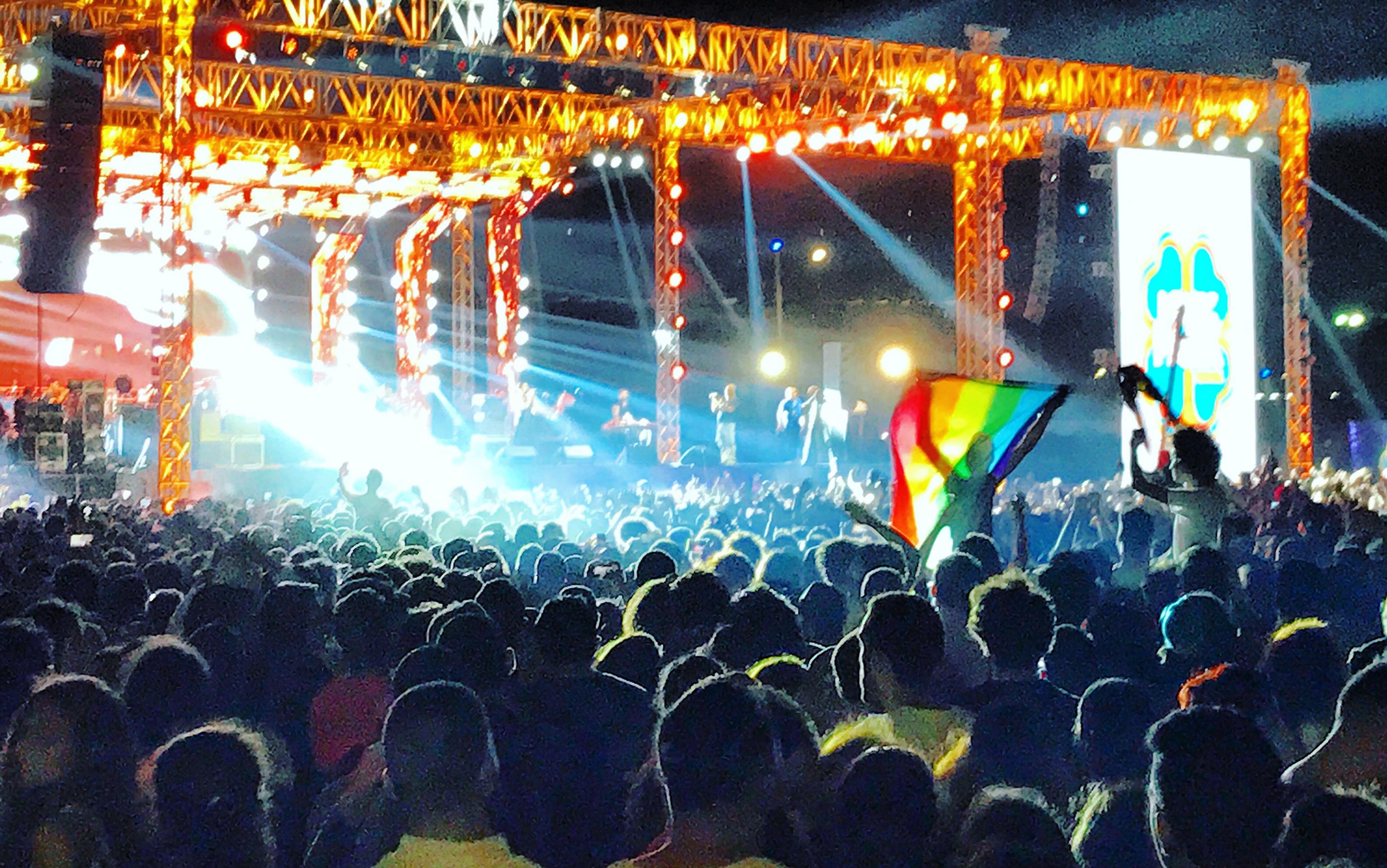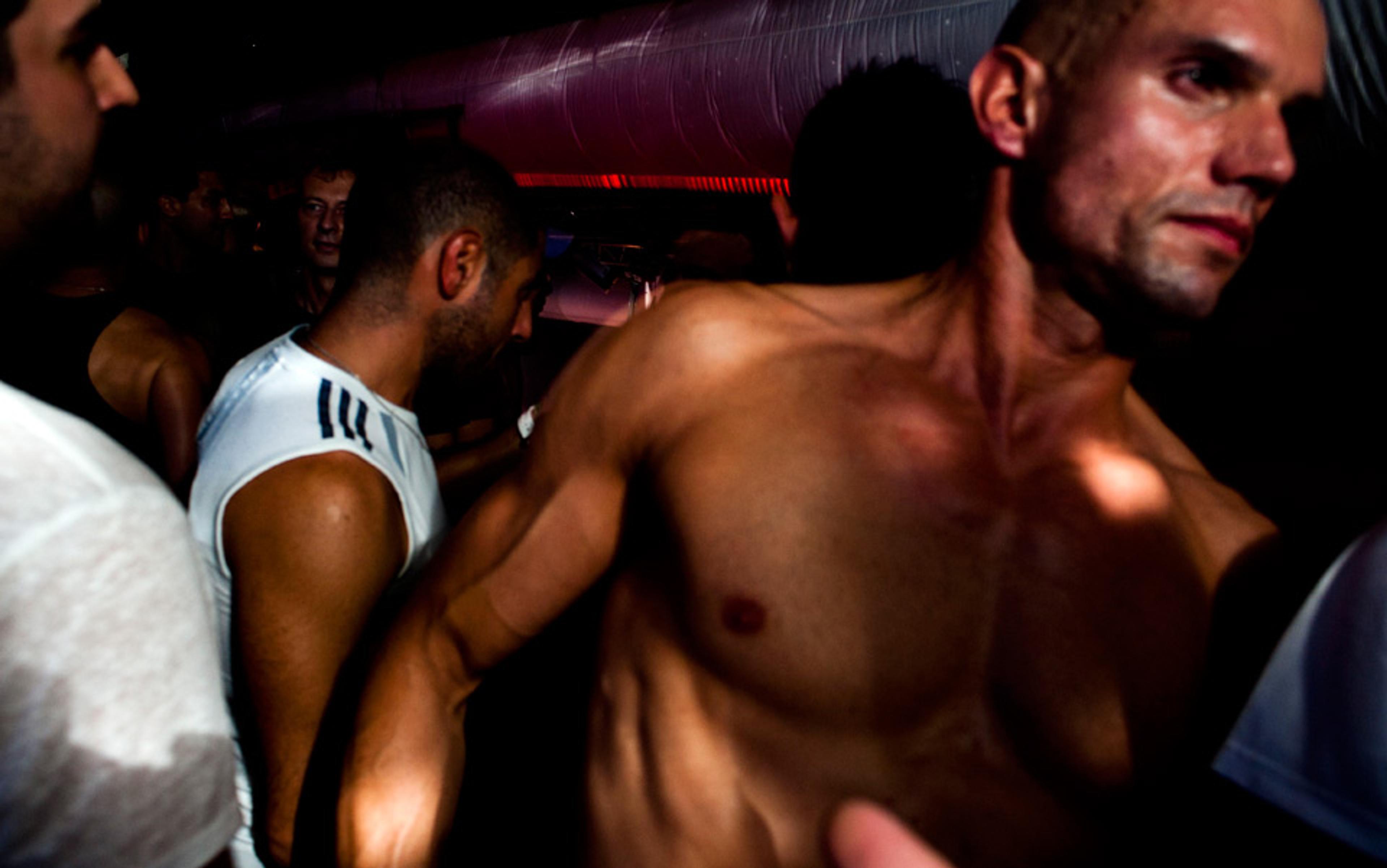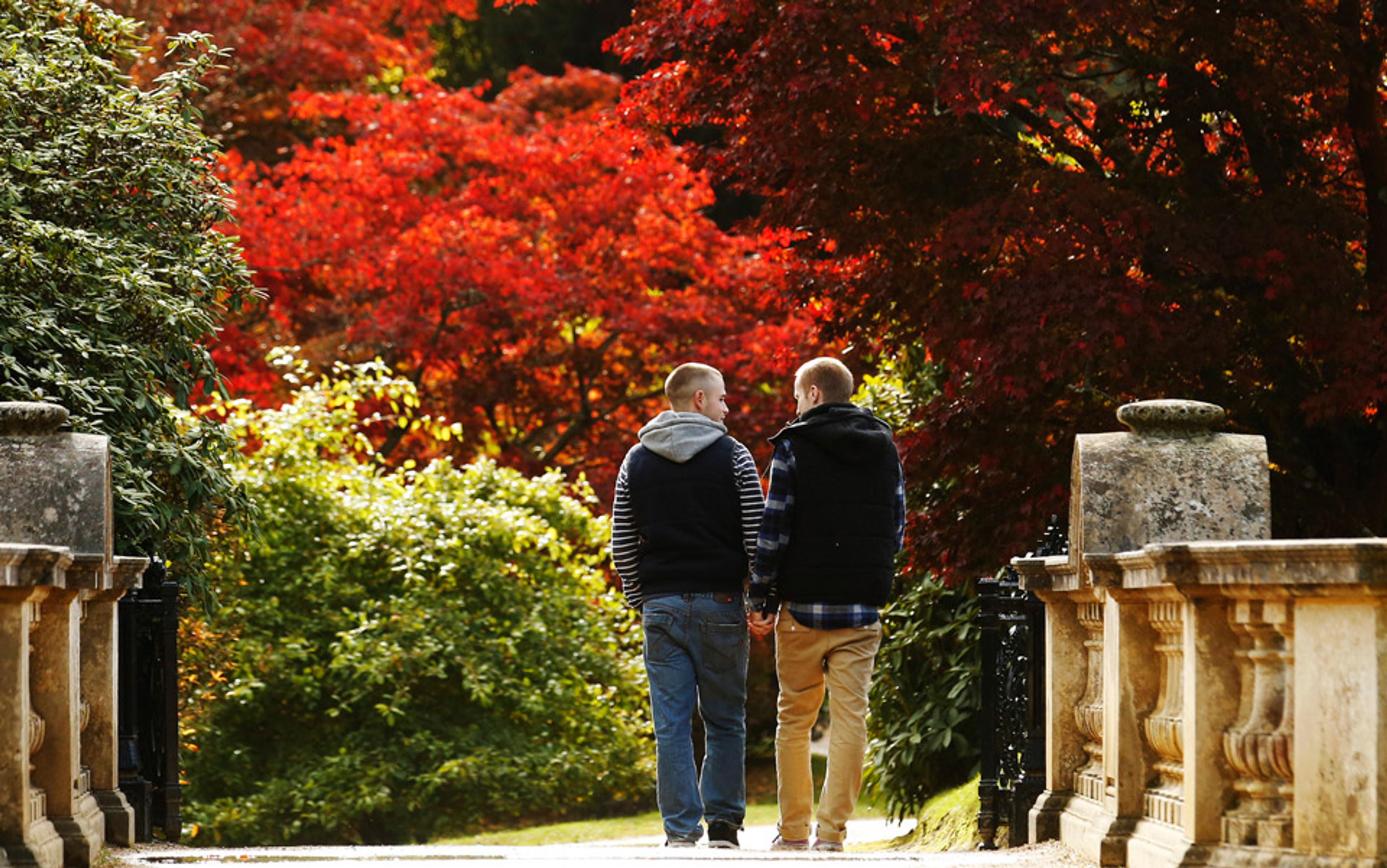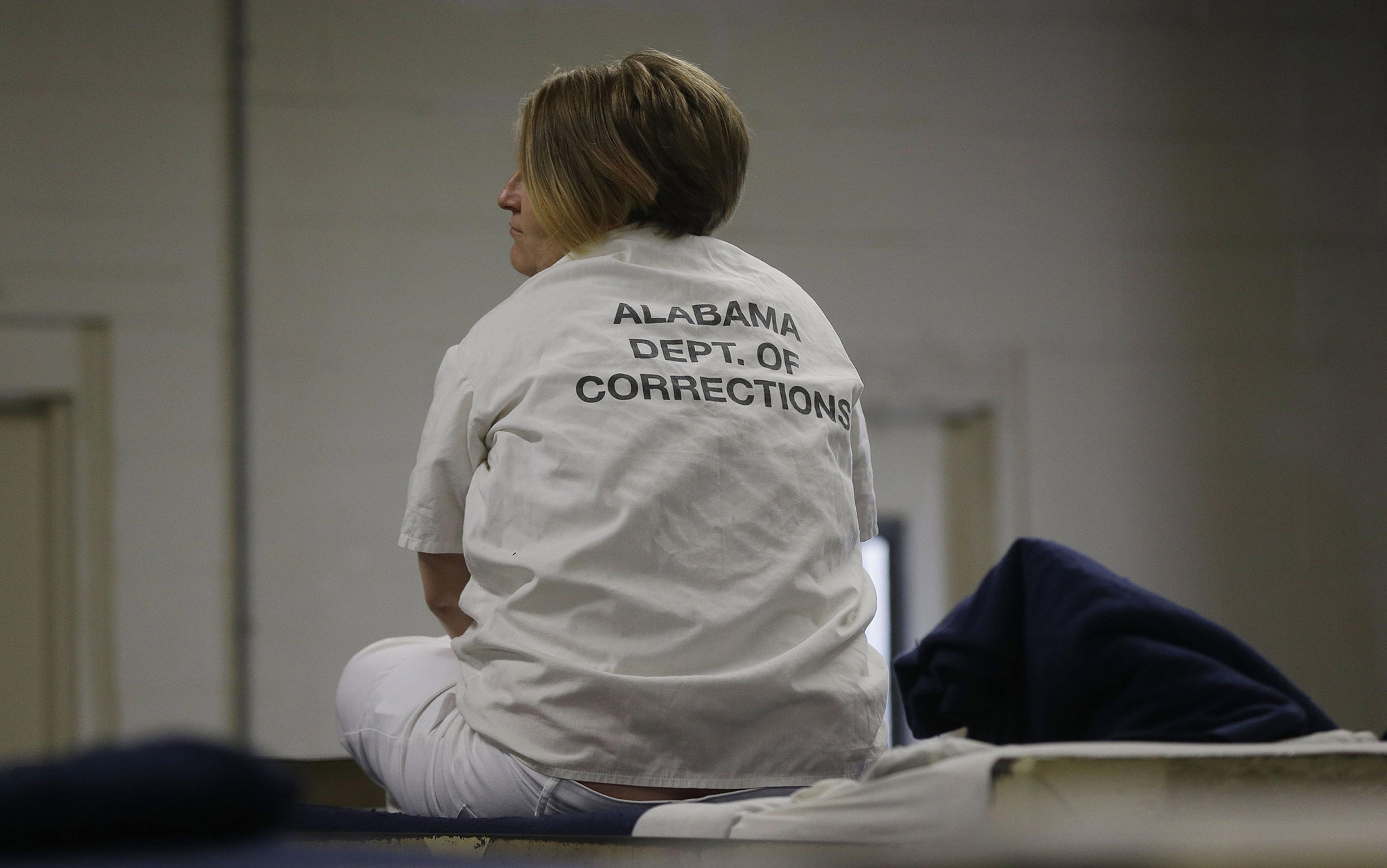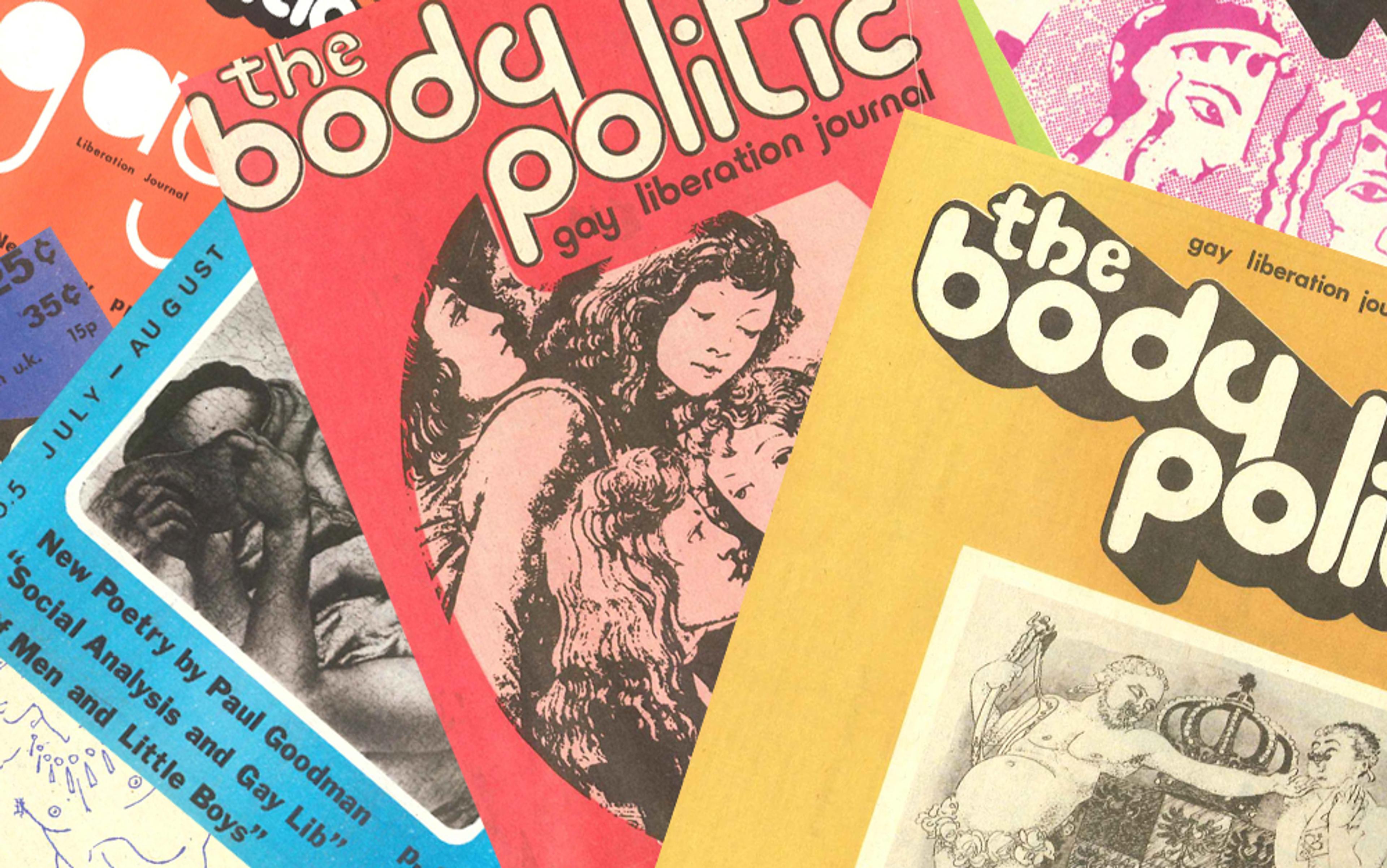When I met John Abdallah Wambere, known by his gay activist nom de guerre Longjones, my first thought was: ‘Will that shirt get him killed someday?’ We had arranged lunch at Fang Fang, an upscale Chinese joint in Kampala, Uganda, and I’d wondered whether I would recognise him. Then he walked in and even my (often unreliable) gaydar pinged immediately. He had a certain out-and-proud swagger, and his rainbow bracelets and pride jewellery rustled and clicked as he walked. He was indeed long, topping out at nearly two metres, not counting the unpruned stalks of dreadlock growing out of his head. And the shirt. Bright purple, hanging like a bright gay sail on the dark mast of his frame, it seemed to propel him forward with the breeze.
He cut quite a different figure from the one you might expect to find in ‘the world’s worst place to be gay’, as a BBC documentary described Uganda in 2011. During the past several years, a broad societal revulsion toward homosexuality has erupted into frank attempts to identify, persecute, and ultimately execute gays. David Bahati, a parliamentarian who is now the ruling party’s chief whip, proposed a bill in 2009 calling for imprisonment not only of gays but also of those who fail to report them. Repeat offenders could be executed, although Bahati assured the documentary’s reporter Scott Mills, a gay BBC Radio 1 disc jockey, that he strongly preferred rehabilitation to hanging.
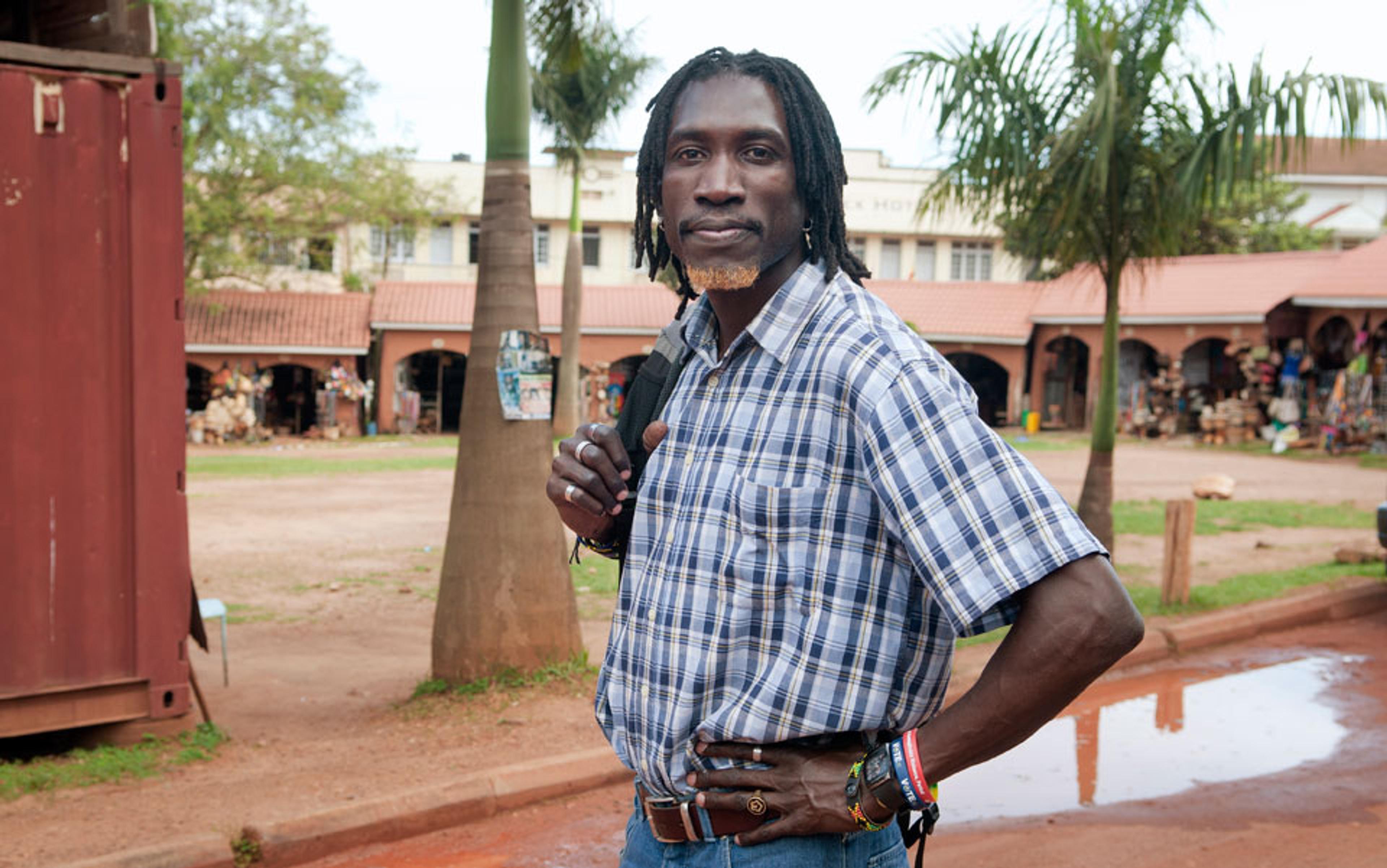
John Abdallah Wambere, aka Longjones
I came to Kampala to meet Longjones and other gay activists, as well as those who wished to oppress, jail, and ‘cure’ them. The anti-homosexuality bill never passed, but Bahati has reintroduced it in every legislative session since. When I arrived, parliament had moved its deliberation behind closed doors, so no one knew whether it would pass this year or, for that matter, this afternoon. The bill’s fate remained a mystery and, at any moment during our meal of fried rice and tofu, we could get news that the knock of a gavel had put Longjones on a path to the gallows.
But anti-gay plots in Uganda had something special about them — the intense, abiding attention of the Western media. Since they learned about the persecution of gay people in Uganda, a cavalcade of filmmakers, journalists, and human rights activists has descended on Kampala over the past few years to bring back story after story about the worsening conditions for gays, and the fraught lives they lead, pinched between the threat of lynching by the common man and prosecution by the government.
Why was Uganda, a country of sickening anti-gay hatred but no executions, whippings, or anti-gay pogroms, singled out as the worst of the bunch?
These reports exposed — as they should have — the religious roots of some Ugandans’ recent obsession with the sexual lives of their countrymen, and showcased the bravery of gay activists. And they raised interesting issues about the unintended effects, positive and negative, of foreign outrage on what was, just a few years ago, a quiet domestic struggle for social justice. Since this planet is blighted with societies where gay people are jailed (Egypt, among many others), flogged (Saudi Arabia), or stoned to death (Iran), the question might reasonably be asked: why was Uganda, a country of sickening anti-gay hatred but no executions, whippings, or anti-gay pogroms, singled out as the worst of the bunch? After all, the anti-homosexuality bill never passed, and it doesn’t take much to imagine how Saudi Arabia would react to the rainbow accessories of Longjones.
For a while, it might well have seemed to outsiders as if anti-gay pogroms were imminent. But with the deft sidestep of a martial artist, the gay rights movement in Uganda has used that moment of ghastly bigotry to raise its public profile, and some of the more extreme elements of the anti-homosexuality brigade have retreated into strategic silence. The situation is still volatile, but the roles have switched in an unpredictable way. I came to Uganda to find out why.
I arrived in Kampala with the recommendations and introductions of Malika Zouhali-Worrall and Katherine Fairfax Wright, who made Call Me Kuchu, the latest and best of the documentaries about gay life in Uganda. Their film has debuted in festivals and cinemas across Europe and the United States, and the gay activists whom it features have often been present to introduce it to the audience in person. ‘Kuchu’ is slang for ‘gay’, and a term that gay Ugandans have appropriated for themselves — something like the word ‘queer’. On 19 June 2012, it premiered at the Castro Theatre in San Francisco — the centre of gay cinematic culture in the US — and the Ugandan guest at the event was Longjones.
When I met him later, back in Uganda, I heard a voice familiar from the film (and, I later realised, from a gay-bar scene in the BBC documentary, too). It was a soft tenor with a Fozzie Bear tone, very hard to mistake. The Castro Theatre audience moved him profoundly, he told me. ‘They gave me standing applause, and I cried and cried.’ To that audience, he was a warrior back from the front. In Uganda, he was fighting battles that San Franciscans had long since won or nearly won — for the rights to marry, to be safe from workplace discrimination, to enjoy medical care from doctors who wouldn’t blame them for their diseases. And the film showed that those battles are, in Uganda, ongoing and at times bloody.
Among the film’s villains is Martin Ssempa, a Pentecostal pastor who is probably the most flamboyantly anti-gay person in Ugandan public life. Ssempa is a former breakdancing champion of East Africa, and now a born-again preacher with a homosexuality obsession that borders on the pathological. He takes particular interest in anal intercourse and coprophilia. A YouTube search for Ssempa’s name will load up your browser with clips of the pastor before his congregation, describing outré gay sex practices and exhibiting extreme gay porn to emphasise its degeneracy. (Stories have it that some of his congregants began to have doubts about him at around the time of such demonstrations.)
The hero of Call Me Kuchu is David Kato, often described as Uganda’s first openly gay man. More accurately, he was the first Ugandan gay activist, in the modern sense of aggressively and openly fighting for the freedom to live his sexual identity in public, and demand the same acceptance that heterosexuals enjoy. He introduced Zouhali-Worrall and Wright to other gay Ugandans, and gradually the subculture crept into daylight for their camera.
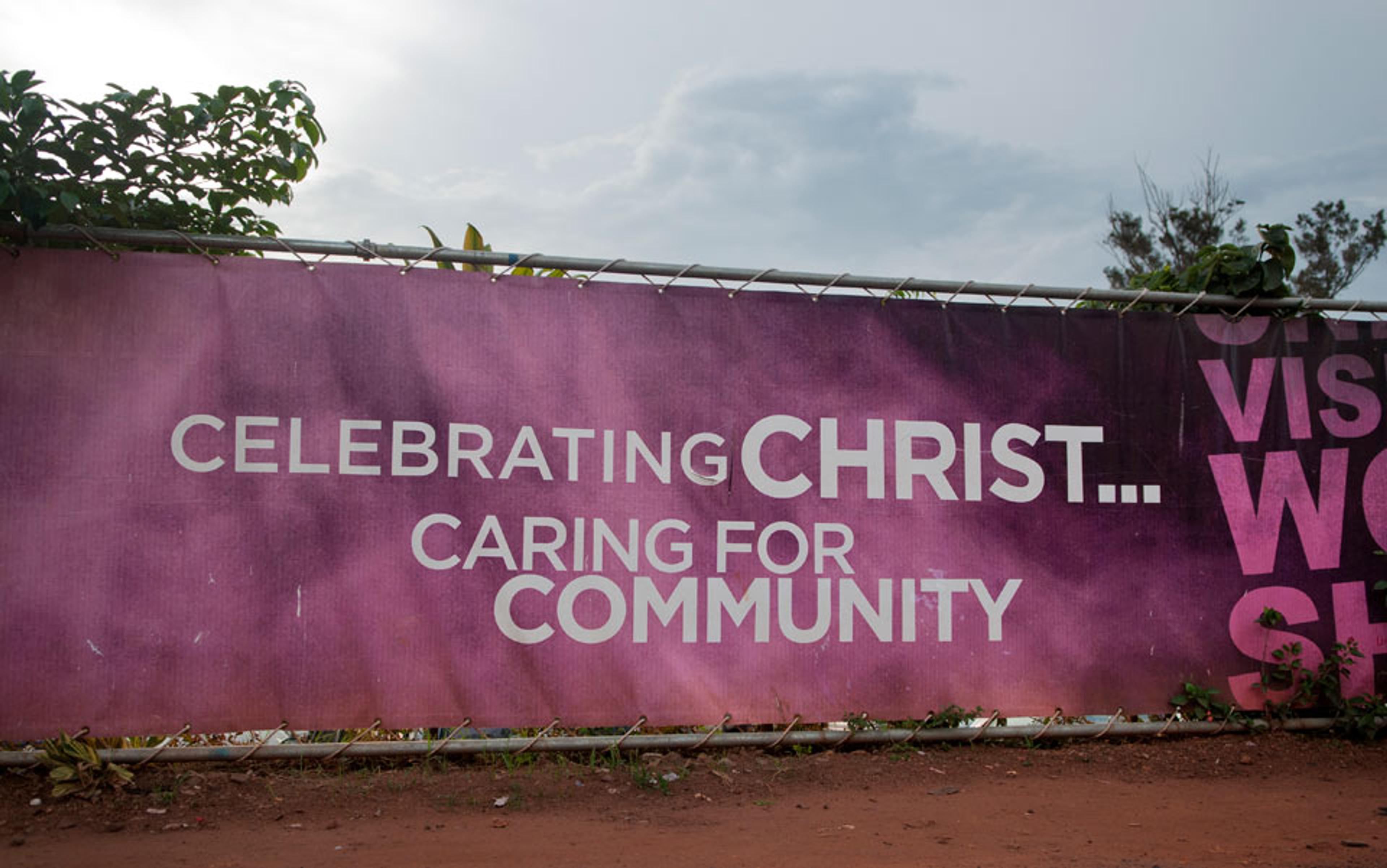
Watoto Church banner in downtown Kampala
Going public took guts. Ugandan society is squeamish even about straight sex. It wasn’t always like this, however. ‘In some traditional religions,’ one Ugandan gay activist told me, ‘spirits would tell people to engage in same-sex activity, and they would say: “My spirit says to do it with a same-sex partner!” That would be accepted by the community. And people who had sexual differences were looked at as different and were assigned different roles in the community. They were not outcasts.’ But that was before Christianity. Missionaries from colonial times followed by new mission efforts from the Pentecostal churches have been highly successful in converting Ugandans, so ‘now, people began saying the practice is an “abomination”. That word is imported by Christianity.’
Uganda is quite possibly the most religiose majority-Christian country I have ever visited. On the road into Kampala from nearby Entebbe airport, I counted churches until I ran out of fingers, toes, and teeth — and we had just barely reached the city limits. When I woke up on a Sunday morning, ready to go in search of a Pentecostal service where I might meet God-fearing Ugandans with strong feelings about homosexuality, I was told by my hotel’s manager that I could simply join the Pentecostal revival that would convene for its weekly service within the hotel itself — and sure enough, within minutes I was surrounded by well-dressed Ugandans speaking in tongues, then listening to a sermon about moral degradation.
So Kato and other gay Ugandans suffered for their sexuality more than they probably would have in the pre-Christian era. (Ironically, the Christians accused homosexuals of being ‘un-African’.) And when Kato went public to assert his rights, his activism provided a pretext for anti-gay forces to whip up a frenzy of hate. Tabloid newspapers discovered a new favourite noun for their banner headlines: sodomy. They began featuring names and photographs of private individuals whom they accused of ‘criminal deviance’. Nearly all faced severe consequences, including loss of jobs, family, and personal safety.
It was the funeral, not the murder itself, that confirmed his transformation from a beloved friend to a hero of gay liberation
Chief among the papers was Red Pepper, still the most prominent and salacious Ugandan tabloid. It makes The Daily Mail look like The Proceedings of the Aristotelian Society, and it is certainly the most degrading and outrageous newspaper I have ever wanted to subscribe to. Its editors shamelessly delight in the shame of others. It functions as a daily print edition of the Ugandan id, with semi-nude women on every front page and a penchant for sex stories, including constant sodomy ‘exposes’: ‘MAAMA FIINA IS A TIGRESS IN BED’; ‘Wicked Hot: This Model Will Set Loins Ablaze’; ‘Kanyeihamba in Sodomy Attack’.
Red Pepper began outing gay people in August 2006, as the gay issue became hotter and surer to entice readers. Copycats followed, and in April 2009 , the weekly tabloid newspaper Rolling Stone (no relation to the gay-owned American music magazine) promised ‘100 PICTURES OF UGANDA’S TOP HOMOS’, adding in the banner headline ‘Hang Them’, in case anyone mistook their photo essay for an act of appreciation; Kato was on the cover. A few months later, in October 2009, Bahati submitted his bill.
Call Me Kuchu shows Kato in 2011 asserting his rights to privacy, equality and humanity before Ugandan courts and against the religiously driven campaigns to destroy and criminalise him. It shows him living alone in a simple house in Mukono, just east of Kampala, with a rainbow flag on his window sill. And it closes with Kato’s defiant words: ‘They kept on saying we are not here. But of late, we are here.’
On 26 January 2011, shortly after filming, he was found in that home murdered, his skull bashed in with a hammer.
Longjones knew Kato well and, as our fried rice cooled, he told me how news of the murder percolated through Uganda’s gay community. ‘We knew that people wanted us to be killed,’ Longjones says, ‘but we did not expect it to happen in such a manner. At a demonstration, you expect violence. But we did not expect a homicide.’ What they got was a brutal, premeditated, daylight assassination. Longjones went to Kato’s home the next day. ‘What I saw — the blood, the brains — it was really terrible,’ he says. ‘They cleaned away the blood in the living room because they didn’t want his mum to see it. But in the bedroom, all the blood had soaked in the mattress. It couldn’t be removed.’
But it was the funeral, not the murder itself, that confirmed Kato’s transformation from a beloved friend to a hero of gay liberation, Longjones says. Uganda’s gay community converged in Kato’s home village for the ceremony — only to find that the local pastor Thomas Musoke wanted to use his death as an opportunity to berate his survivors. ‘After everyone had given speeches, this guy comes up and says, “I knew David and talked with David. And he cannot repent anymore. But you people can, and you must. And we pray that his whole clique perishes.” That is where problems started, and we could not tolerate this man anymore.’
‘Do you know what it means when you lose someone you love so much, someone you see as a mentor?’ Longjones asked. ‘You just… get tired. You get fed up. And you don’t care what consequences come your way. What happened at the funeral just made everyone get sick and tired.’
Kato’s death made international news, and served as confirmation of Uganda’s reputation for gay-hatred. Much of the Western diplomatic corps attended the funeral and watched appalled when the pastor called for the death of Kato’s mourning friends. And by turning the mentor into a martyr, it moved the Ugandan gay rights struggle into its next phase.
There was only one problem. No one really knew who killed David Kato, or why. He was a man with many enemies. The legions of gay-haters looked like prime suspects. They were, after all, loudly calling for his execution from their pulpits, parliamentary rostra and editorial pages. But other suspects included the newspapers he had successfully fought for their violations of privacy and decency. Each of these had financial interests and powerful backers.
Even in death, Kato has been dogged by rumour and innuendo. Many of his detractors have reason to cast shadows over his legacy, and some have claimed his assassin was a jilted lover. A human-rights activist in Kampala told me the police even knew Kato’s new boyfriend (were they vetting his romantic partners?) and saw trouble coming. ‘The guy you are relating with is a common criminal,’ they allegedly said. ‘We warned him, and he wouldn’t listen.’ If these rumours are false — there is no clear evidence for them, though they are widely believed — then Kato would certainly not be the first gay activist whose death has been blamed by his (self-satisfied) opponents on his sex-life. Eventually, a man called Sidney Nsubuga Enoch (some would say a scapegoat) was prosecuted for murder and sentenced to 30 years in prison, but no anti-gay motive was acknowledged or discovered, and Kato’s friends remain unsatisfied by the result.
The organisation where Kato worked, Sexual Minorities Uganda (SMUG), soldiers on, and its employees (all friends of Kato’s) preserve his memory through advocacy work. It serves as an umbrella group for non-governmental organisations (NGOs) and coordinates their political and social work on lesbian, gay, bisexual, transgender and intersex (LGBTI) issues. Their advocacy has, if anything, grown more aggressive since his death — and has quite possibly become more effective because of it. When Kato began, Uganda had no LGBTI groups. Now, there are so many that, on the outskirts of the city, far from the bedlam of downtown, they need SMUG just to keep them in line.
I followed intricate directions to get to SMUG’s offices, set in a suburb of Kampala nearly an hour from the city centre during daytime traffic. That hour could easily stretch into two if you take a car. Instead, I had clung to the back of a boda-boda, or motorcycle taxi, and weaved through traffic perilously, stopping at no fewer than five separate roundabouts so my driver could ask directions to the quiet hilly neighbourhood to which Frank Mugisha, SMUG’s director, had told me to report. The last few kilometres I traversed by foot, along a red dirt road next to a hot, green gully. During my 10 days in Kampala, that empty road was the one place quiet enough for me to hear cicadas singing, and the rustle of vegetation in the September wind.
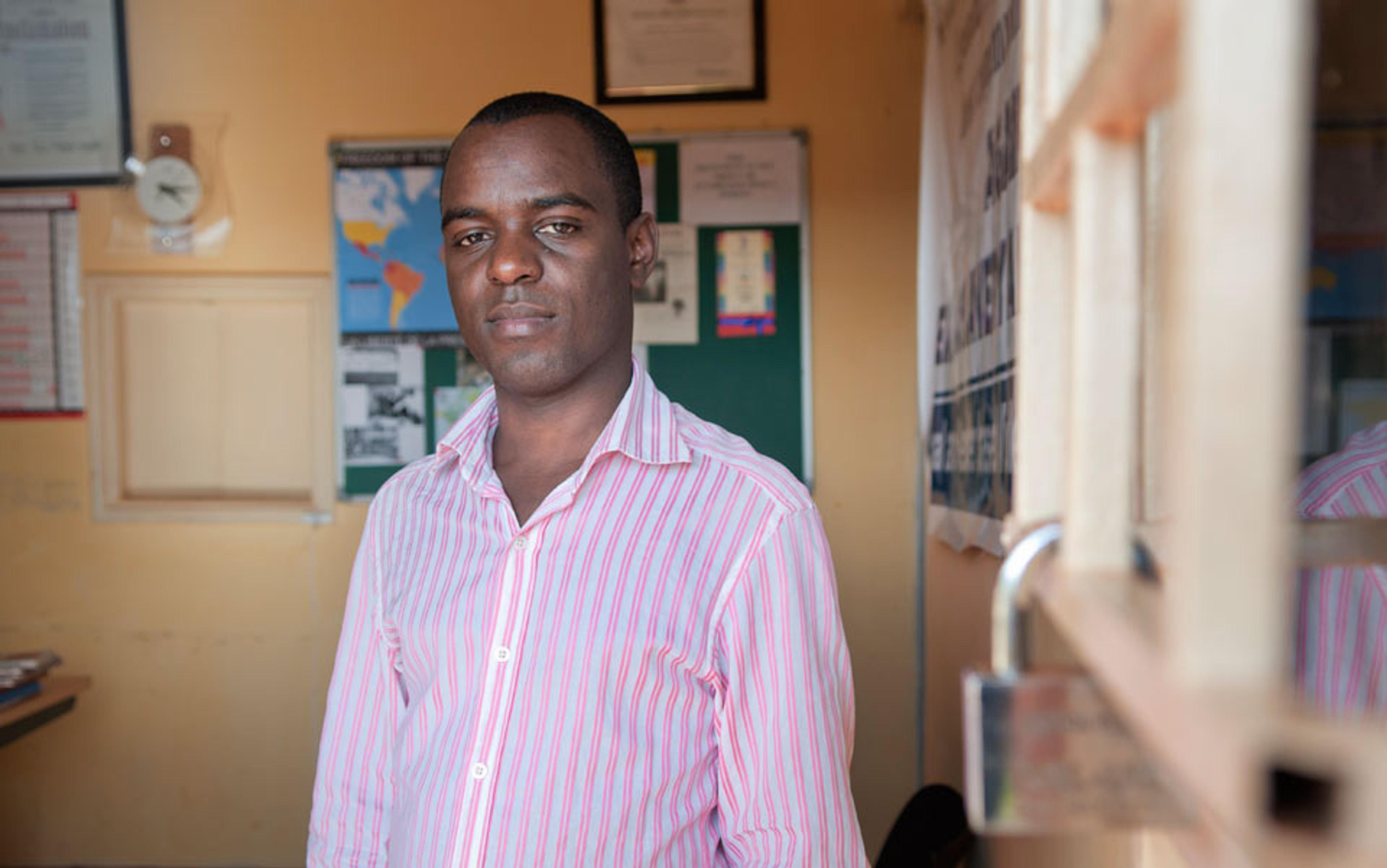
Frank Mugisha, director of SMUG, at his offices
Mugisha is Kato’s heir as the most prominent gay activist in Uganda. The small one-storey house across from the gully is mission control for SMUG and, by extension, much of the Ugandan gay rights movement. He has been ‘out’ for more than 10 years and, as Kato did before him, he faces frequent death threats. Unlike Longjones, nothing about Mugisha appears stereotypically gay — except perhaps the bright yellow T-shirt he wore when I met him in his office, with ‘SAY NO TO BAHATI’S BILL’ stencilled across the front. An IT specialist by training, Mugisha is as short as Longjones is tall, and impeccably mannered and dressed. The T-shirt was anomalous: he told me he has more than 20 suits. Like all the gay activists I met in Uganda, he is so attached to his smartphone that some form of surgical implantation might be a reasonable consideration.
Mugisha’s number is public, and the phone whistled and jingled constantly. Usually, it is gay people and gay activists who want a word with him, either to congratulate him or to ask advice. But there is an occasional menacing voice threatening to do to Mugisha what was done to Kato nearly two years ago. Harassment forced him to move out of his home a few years ago, and to another about an hour from SMUG. ‘I found my car tyres slashed many times,’ he said. ‘You shouldn’t get surprised if you read in the news that I have been attacked along the road, or this place has been set on fire.’
But international interest in the gay rights movement has altered the equation of power and visibility significantly. Bahati’s bill, first submitted in 2009, took the anti-gay frenzy a step too far by seeking to enshrine bigotry in law. The US State Department under Barack Obama began treating the anti-homosexuality issue as one of the major sticking points in smooth relations between the countries. And the international outrage, Mugisha said, made Uganda irresistible for journalists wanting to write about social justice.
‘Now we are talking about social identity. We are talking about family. We are talking about what you can do to accept your child if he comes to you and says he’s gay.’
‘That’s why all these stories have come out. That’s why we are so famous!’ he told me, with admirable candour. ‘If I was leaving my house and broke my leg or got killed, it would be horrible for Uganda. The whole world would just say, “They killed another one! These Ugandans are horrible!”’ The New York Times and the BBC were among the major news outlets that reported on Kato’s death, and even more would note the slightest attack against Mugisha. Once, being an out, gay activist made one a magnet for attacks. Now it confers a measure of protection.
Cynics have wondered whether the activists are in it for the fame. ‘Organisations that support gay rights walk openly in this town,’ one Ugandan human rights worker told me, implying that foreign and Ugandan activists have overblown the threat of persecution. ‘If Bill Clinton comes here, he will meet you [meaning gay Ugandans]. You get to hang out with bazungu [white people], and they give you awards.’ The international activist community has certainly adopted Mugisha as a star; last year, the Robert F Kennedy Center for Justice and Human Rights garlanded him with its Human Rights Award, and he now travels frequently for appearances and overseas work.
Mugisha said he has, in fact, declined the most valuable offers. ‘I have a really high profile, and I could snap my fingers and get a job with an NGO or get asylum in any country,’ he told me. ‘Ugandans think it’s about money. But when they see that you are doing hard work, and talking to them about challenges and discrimination, they start to understand that this is a real cause.’
Most remarkably, the Bahati bill itself has turned into a catalyst for exactly the conversations that Mugisha wanted Ugandans to have. There is a strong taboo in Uganda against talk about sex of any type, he told me. And the mere mention of homosexuality once forced unwanted images into their minds of two men having anal sex. ‘If you talked about homosexuality, they would ask, “Oh, so you want to talk about anal sex right now? Sorry, we won’t accept that,”’ Mugisha said. Now the ubiquitous talk of homosexuality has ground down the taboo, and allowed the discussion to move to more relevant areas. ‘Now we are talking about social identity. We are talking about family. We are talking about what you can do to accept your child if he comes to you and says he’s gay.’ When Mugisha shows someone his business card, the words on it no longer trigger a mental film-reel of gay porn, but an image of fully clothed legislators talking about the merits of their bill.
‘The bill has its pros and cons,’ Mugisha admitted. ‘It has created dialogue. People can actually talk about homosexuality. And its extremeness has made people question it. Even faithful Christians are asking why they are being told to report their own sons and daughters.’
So Kato’s death and the anti-homosexuality bill have, oddly, flipped the old status quo. Once gay activists congregated in the shadows and feared the anti-homosexuality bill, now they seek out sunlight and see unexpected advantages to it, vile though it is. Gay people face most danger when they are closeted, trying to stay invisible, and get unexpectedly outed.
Ironically, their tormentors are the ones who have been sent scurrying into the shade. I approached David Bahati — the Young Turk legislator who has led efforts to pass the anti-homosexuality bill — by email, phone, and in person in his office. He dodged me at every pass, perhaps because nearly every interview he has given to international media has made him appear fanatical and intolerant, and has shamed Ugandans sensitive to international human rights standards. More and more Ugandans have spent time abroad and been exposed to more tolerant cultures — even neighbouring Kenya is considerably more LGBTI-friendly — and few of them like seeing their home country associated in international headlines with intolerance and social norms that have been extinct in the West for decades.
And then there are people such as Martin Ssempa, the frothing-at-the-mouth pastor who showed gay porn to his congregation to whip up their anti-gay feelings. I wanted to meet him to find out about his current preoccupations, and how his position on the gay issue had evolved. ‘This may well be the most painful interview of your life,’ one human-rights worker advised me when I asked for his contact details.
Ssempa first demanded to know my purpose, and then asked for a few hours to decide whether to speak to me. Then he called me and invited me to come to the Buganda Road courthouse on Monday to observe him ‘stand up for the rights of those who have been sodomised,’ and he drew out that last word into three stressed syllables (what my Classics teacher would have called a ‘molossus’), savouring each one like a rich dessert melting on his tongue. It turned out that he had been named as a defendant in a lawsuit by another pastor, Robert Kayanja, brother of John Sentamu, the Archbishop of York. Ssempa had accused Kayanja of ‘sodomising his flock,’ a charge that the Buganda Road court eventually ruled calumnious. Ssempa was ordered to pay a million Ugandan shillings (£240) and perform 100 hours of community service.
There are many who would prefer that the professional gay activists shut up while they get on with the complicated business of both hiding and expressing their sexuality
I tracked down Ssempa between court sessions, before the verdict was delivered. He wore academic regalia and surrounded himself with acolytes. When I finally caught him, he shook my hand gregariously and almost immediately excused himself. ‘I have an urgent need to go to the toilet,’ he said, promising to meet afterwards. He then slipped out of the building and did not return.
The arc of social justice has contorted itself in unexpected ways. Ssempa and Bahati surely consider this a sign of these benighted times. Even so, most Ugandans still support their efforts to criminalise and persecute homosexuals. Politicians fear the condemnation of the international community if they support Bahati’s bill, but they face domestic unpopularity if they don’t — probably the reason why the bill continues to be frozen in process. Both sides of the struggle seem to agree that most Ugandans abhor homosexuality — and for that reason there are many who would prefer that the professional gay activists shut up while they get on with the complicated business of both hiding and expressing their sexuality.
Pepe Julian Onziema, a transgender man working at SMUG, guessed that two in five LGBTI Ugandans prefer life in the closet. Consider that figure: nearly half the constituency that SMUG tries to represent would prefer not to be represented. They have families, they have affairs, and they stay as far from SMUG as possible. ‘I get threats from gay people, too,’ Mugisha says. When they call SMUG to berate them for raising a ruckus and potentially disrupting their closeted gay lives, Onziema, who received a Bill Clinton Global Citizen Award for his work, says he’s protecting the closeted gays of Uganda by personally assuming the burden of dealing with public questioning and intolerance. ‘They think we are really crazy, and we are blowing their cover,’ he says. ‘We tell them, “We are doing this for you”. But they say, “We did not ask you to do this.”’ Uganda has no radical gay group that outs closeted gays, like OutRage in the UK. Red Pepper does that well enough without their help.
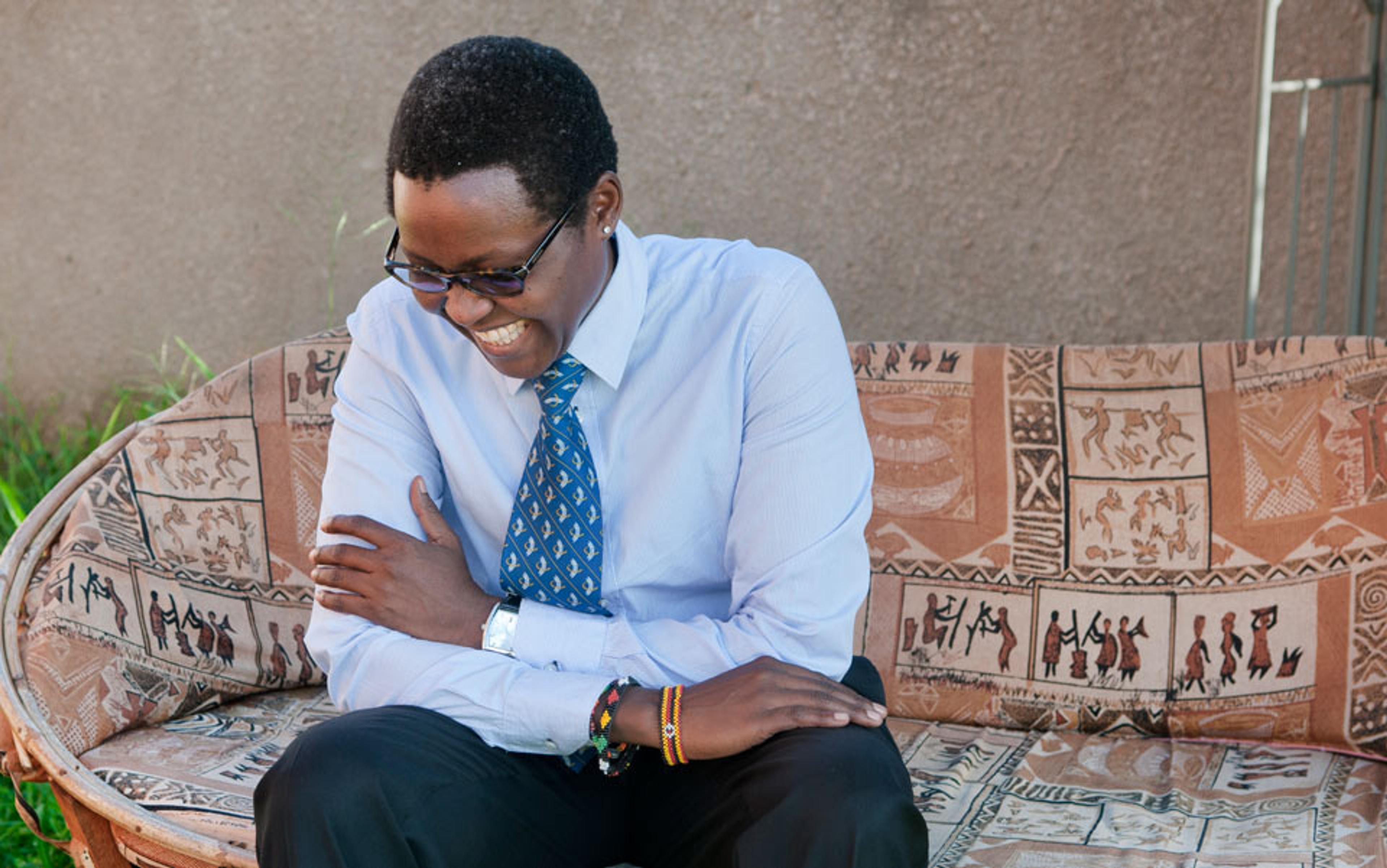
Pepe Julian Onziema
Geoffrey Ogwaro, a lawyer who coordinates a coalition of organisations opposing the Bahati bill, told me that there is a cohort of wealthy, well-educated gay people who disdain the politics of the movement, despite being potentially powerful allies for it. Often snobbish about their socialising, though less picky when looking for anonymous sex, they ‘want nothing to with the politicisation’, Ogwaro told me. ‘They will say, “We’ve lived our private lives, and we’ve had fun and had our parties and we have no issues with anyone. Suddenly, you guys are politicising this whole thing and ruining a good thing for us.”’
By staying closeted, of course, they enjoy none of the protections that high-profile activism confers. If outed, they can be hounded by mobs: if they are lucky, Mugisha will get their panicked phone calls at SMUG and send a rapid-response team to whisk them to safety before the crowd gets violent.
It seems the anti-homosexuality bill has poked a hornet’s nest of anti-gay sentiment and those who have benefited most are the radical activists on either side. Those caught in the middle are the closeted majority, trying to maintain a quiet sex life and keep out of the line of fire, reluctant to upset the mainstream.
I did meet gay Ugandans whose lives felt considerably more tense than those of Frank Mugisha, Longjones, or Pepe Julian Onziema. Stosh Mugisha, who also features in Call Me Kuchu, vetoed several lunch venues before I came up with one where he felt comfortable. No relation to Frank, Stosh is, like Onziema, a preoperative female-to-male transsexual, who at the time of filming self-identified as a lesbian. And over lunch, Stosh rehearsed a gripping and awful story of rape, attempted suicide, and contracting HIV, culminating in a jittery, paranoid life forced into the public eye by Red Pepper. ‘Do you know stuff about STOSH MUGISHA and where she lives? Call the editor on 0782025368’ the paper invited. Another female-to-male transsexual, Nikki Mawanda, described a narrowly circumscribed life. Only a few places in this large city were safe havens: ‘First, I go to Speke Hotel [for food or a drink], and then I go to the movies, or to a play. And then I go home.’
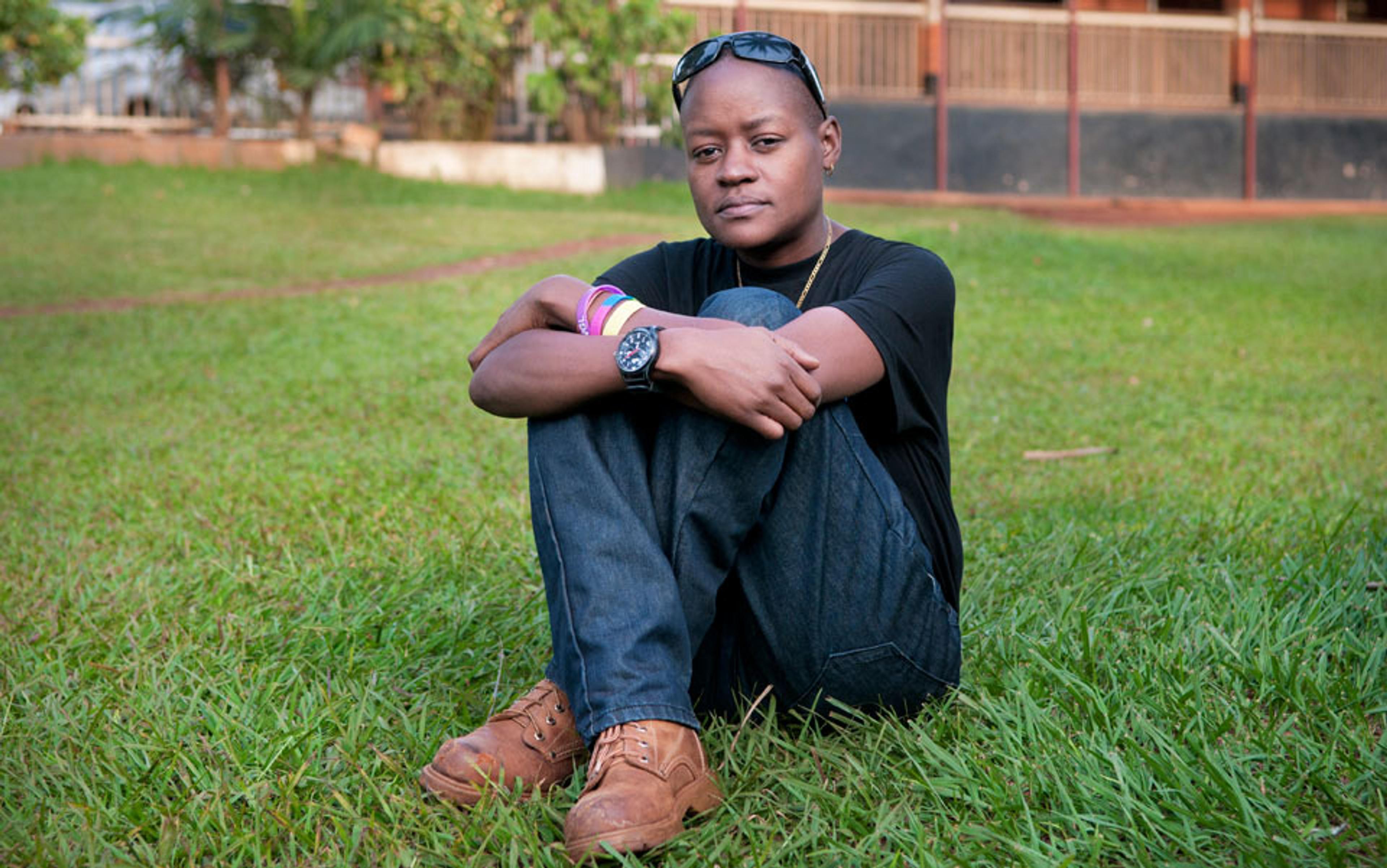
Stosh Mugisha
Once inside their safe havens, even Stosh and Nikki lived in a way that was somewhat open and unguarded: when we met at the Speke, Nikki was not merely comfortable but loud, proud, and uninhibited. And Stosh, like Longjones, wore gay pride jewellery and insignias that could, if he had wanted to, be left at home. They both relished their roles as activists. Stosh seemed excited to be flown to a Russian screening of Call Me Kuchu, and Nikki was happy to have found a way to make a living advocating a cause he believed in. Plenty of international donors wanted to throw money at this problem, he said. ‘If you make a proposal, you can get money for activist activity.’
Of course, they deserved to be proud of their bravery, and the knowledge that their work would probably save the next generation of gay Ugandans from the same tabloid treatment. But it did make me wonder about the role of victimhood here. The gay rights cause in Uganda started with violent persecution, which escalated with the Red Pepper and Rolling Stone outings, the ridiculous and self-defeating anti-homosexuality bill, and the murder of David Kato, however ambiguous the motive. That persecution was originally wholly terrible. Then it became terrible, but also useful. Once the persecution had provoked a certain level of outrage, especially internationally, the tide reversed dramatically. Now status as a public victim is a protective talisman as well as an income-generating activity, and there is a perverse incentive to revel in it for the cameras, or, when meeting with journalists like me, to report it as a perpetual crisis.
‘People ask me: “Do you even get out of your house?” They portray us as just victims. I don’t like to be portrayed as if we’re not even here.’
Radicalism still works — and it works best when there are radicals on both sides. Bahati and Ssempa pushed their agenda, and Kato and Mugisha pushed theirs, until the conflict reached a climax so atrocious that the world couldn’t ignore it. Now, NGOs such as SMUG could continue their work under international protection. But activism has to be vigilant about rhetoric and reality if it is to maintain credibility. Among Ugandans and foreigners focussed on human rights in Uganda, the success of the loud and smartly-executed gay-rights effort has drawn some exasperation, because Uganda has multitudes of social justice issues, and the prominence of LGBTI issues comes at the cost of crowding many others from the limelight. Indeed the only other issue in African to attract comparable attention recently was the Kony2012 film which contained its own striking, rhetorical excesses.
Jacqueline Kasha, a lesbian who heads Freedom and Roam Uganda, one of dozens of LGBTI NGOs, calls the anti-homosexuality bill ‘Uganda’s Nuremberg Law’ — a comparison that sits uneasily with many Ugandans, gay and straight, since persecution of gays in Uganda hasn’t reached (and isn’t likely to) anything like those in early Nazi Germany, gearing up towards the Holocaust. Frank Mugisha cringed when I mentioned it. ‘We lose legitimacy,’ he said. ‘Our government says we’re just being vocal.’ If there is a lesson from Kony2012 and the LGBTI struggle, it might be that the relationship between accuracy, honesty and succesful activism is a fraught, but important one.
Even Call Me Kuchu, Mugisha told me, struggled to resist the narrative of victimhood. ‘It made me sad,’ he said. ‘Some journalists come here and they ask, “Tell us about the threats!”’ The threats, he said, don’t ‘really represent the movement. People ask me: “Do you even get out of your house?” They portray us as just victims. I don’t like to be portrayed as if we’re not even here.’
In fact, he said, the pro-LGBTI organisations have strategies and tactics, and are proceeding successfully and by their own wits. Ugandan civil society and government are complex entities, and neither is simply at the mercy of unopposed reactionary forces: the trap of seeing things in binary terms has been sprung often enough by Western activists. African social-justice movements are just as byzantine in their webs of power and protest as Western ones, and therefore no victory is permanent and no setback final.
Even the passage of an anti-homosexuality bill would not be a doomsday scenario. Frank Mugisha, for one, seemed confident that even if Bahati’s bill was passed, ‘it couldn’t be implemented’. He pointed out that existing laws already criminalise ‘carnal knowledge against the order of nature’ (a colonial inheritance) yet this law is seldom enforced. ‘Who has ever been arrested, detained, and put to jail?’ he asked. ‘If the law is passed, are they going to put cameras in people’s bedrooms?’ Mugisha said he expected the Constitutional Court to strike it down, although human rights lawyers I spoke to were less certain. ‘Even the courts are part of society,’ said Nicholas Opiyo, a prominent human rights lawyer.
Before I left, I wanted to see the Ugandan gay community in a candid moment, outside the stilted atmosphere of formal interviews. By chance, my visit coincided with a ‘rainbow’ event — one of a series of queer-friendly spectacles, this one at a bar called the Tilapia Cultural Centre.
The owner, David Cecil, a friendly British expatriate, found himself unintentionally thrust into the activist crowd after he allowed a play to be staged there in the summer. The play, The River and the Mountain, had a gay character, and Cecil, who is straight, was accused of ‘disobeying lawful orders’ for staging it without authorisation. He spent four days in prison and was released on bail in September, but his passport was confiscated. When I met him at the Tilapia centre’s bar, it seemed that nearly all of Kampala’s out gays had convened there too, for a talent show and dance.
Openly gay Kampala isn’t a huge community, and I recognised many from my interviews. Longjones was MC. Stosh, looking very at ease, gave me a little hug and introduced me to a few lesbians. Frank Mugisha, a young godfather to the whole community, showed up around 11pm and was forced by an adoring crowd to give a few seconds’ worth of remarks.
That the talents failed to scandalise me was only because I had previously seen much more provocative queer spectacle in places such as London and San Francisco, not to mention Martin Ssempa’s YouTube videos. A few male performers donned skimpy, gold-trimmed drag outfits and pranced onstage, each trying to outdo the other’s arse-wiggling. Longjones called for the audience to scream out for their preferred wiggler, and in his gentle Muppet voice he pronounced the competition a tie.
The night ended early for me, which is to say not too far into the morning. When I emerged from Tilapia, I was slightly surprised to see that the place had no security at all, just an open-air staircase from the road, down which dozens and dozens of flamboyantly dressed homosexuals had descended for hours, without harassment. At the bottom of the steps, they were grinding with each other on the dance floor without fear.
At the top of the steps, some boda-boda drivers lingered, perhaps to wait for fares, to gawk at the flagrant sinning, or to indulge their bi-curiosity. I couldn’t tell which drivers came for which reason, but I knew none was there for killing. The gay rights movement in Uganda is still young, I thought, but that seemed like a good start.
